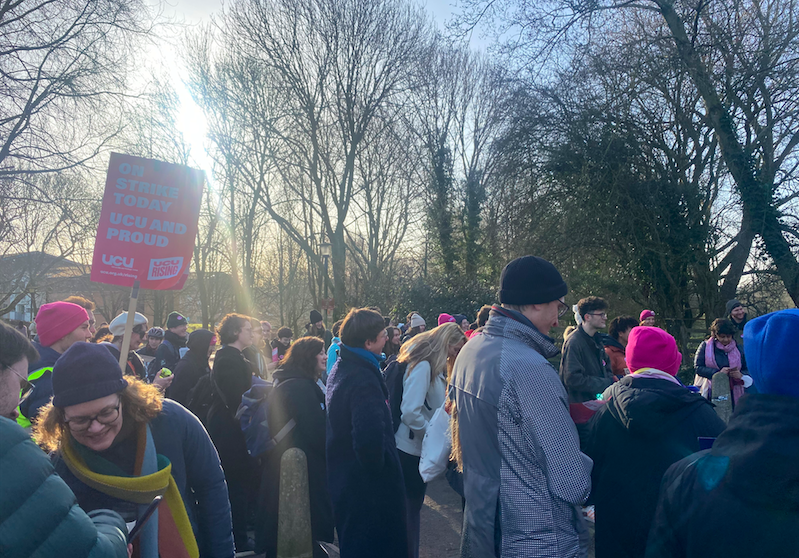
University of York students could be receiving degrees with no classification this summer
The uni has announced its plans for managing the impact of the marking and assessment boycott
The ongoing marking and assessment boycott, currently affecting 145 universities across the UK, has been a major source of concern and uncertainty for students this term. The action, which sees UCU members refuse to undertake any marking or assessment responsibilities, will cause delayed and absent marking that may interfere with student progression and graduation.
The University of York has set out its plan to deal with the, currently unknown, impact of the boycott on its website. For both finalist and progressing students, the university has said that it will “use all the grades they have” to make informed decisions. These decisions will be based on the amount of marked credits a student has by the end of the academic year.
In some scenarios, final years may graduate with a temporary “ordinary” degree (one with no classification), whilst returning students may be asked to decide for themselves if they should progress to their next year of study, based on university advice.
Here is a full breakdown of the University of York’s plan to manage the impact of the marking and assessment boycott:

Graduation ceremonies will take place this summer
For final year students, the thought that after years of hard work (especially in light of the Covid-19 pandemic) they may not be able to graduate is a disappointing one. In an interview with University Radio York, the uni’s Vice-Chancellor, Charlie Jeffery, was very certain that “there will be a graduation this summer,” saying they are “certainly going to celebrate the achievements of our students.” So despite the marking boycott, graduation celebrations will be taking place this summer.
Most Read
However, depending on how many credits a finalist student has marked by that point, the degree awarded at these celebrations may look slightly different. Overall, the uni has said that if the marks it has for a student are enough to be “confident” of their overall outcome, it will “lock it in to minimise the impact on students”. Whereas if it don’t have enough information to make a “firm decision”, the York will “support you to inform prospective employers or educational institutions about the situation.”
How will my degree outcome be calculated?
This will depend on how many credits you have marked in time to graduate. If all of your marks are available, then it will be business as usual and the boycott should have no affect (congrats).
For students with more than 80 credits marked, the university will be able to make a decision about your award. Students will be asked to resit any failed marks, however if all marked modules have been passed, then their degree will be awarded based on an average of those marks. As the university intend to have all work marked eventually, and any marks that may bring your average up will be entered later. However, York Uni is guaranteeing that “your final result won’t go down”, and lower marks that come out later on won’t affect your degree classification.
Some York students could receive temporary degrees without classifications
If you have between 60 and 79 credits marked, the uni will be able to award you a degree at the normal time, but it won’t be your “final degree”. These students will receive an “Ordinary degree”, which will have no classification. These degrees will come with a letter to explain the situation to employers and universities. Once all marks are available, these temporary degrees will be replaced.
The university will not be able to award degrees to students who have less than 60 credits marked, although it insists they “don’t think this will be very common”. These students will also receive a letter explaining the situation to employers and universities and will still be invited to graduation. They will still be able to cross the stage, and those at the ceremony won’t be able to tell who is being awarded their degree and who isn’t. As soon as marks are available, these students will have their award calculated and officially awarded in absentia.
What about returning students?
Whilst the issue of graduation has been a key focus in light of the boycott, returning students may have their progression impacted due to delayed and absent marks. Similarly to final year students, the University of York plan to deal with the impact on a student-by-student basis depending on the amount of marked credits available at the time.
Again, students who have received all of their marks in time will be able to progress as usual, and a decision will be able to be made for students who have at least 80 credits marked. For the latter, averaged from passed modules will be used to calculate a “stage average” used for progression. If once all marks are available this average can increase, that is the grade that will be used to calculate your degree classification.
Students may be asked to decide if they progress to the next stage of study
The situation will be less clear for students with less than 80 credits marked. The university will make an assessment of likely it is that students will be successful at the next stage of study based on the information available (students will be asked to resit any assessment where they achieved less than 40 marks). The average of marks available will form the basis of this assessment, which will then be shared with students and it will be left up to them to decide if they progress to the next stage, so long as they have passed the work that is yet to be marked.
If marks become available after this decision has been made in which a student has failed a module, they will be asked to resit it. Since this will likely clash with their studies in the next academic year, as marking could continue to the end of the calendar year or longer, students will be able to claim exceptional circumstances and accommodations will be made. This is where a risk becomes apparent for students who decide to progress to the next academic year without all of their results: if a student fails those resits, then they may not be able to continue their studies in York.
For students presented with this decision, this is the uni’s rough guidance: If you have an average of over 60 per cent, then you will most likely be able to progress; for those with an average of 40-60 per cent, they will probably be ok to progress; those will an average between 10-40 per cent are advised to consider their decision very carefully; and students with an average of less than 10 per cent based on the marks available will be asked to take a leave of absence until the full marks are available.
The university has said that it is unlikely many students will be left with no marks, but if it does happen their case will be considered “individually at an institutional level.” It said: “We’ll be making a decision about whether or not you can progress based on the best information we have available, including marks from previous years, and the information we can gather about your engagement from your department.”

Why is this happening?
The Universities and Colleges Union (UCU) have turned to boycott action as part of an ongoing campaign over pay and pensions, casualisation, pay gaps, and workloads. After 18 days of strike action last term, progress on the pensions dispute was made in negotiations, however the UCU’s rejection of the UCEA’s last pay offer led to further action to take place, in the form of the marking boycott.
Whilst the UCU has admitted this is a “severe step to take”, they insist that they “have no option left” and have “reached a tipping point” where this action is necessary.
Have you read this @uniofyork VC and team? Your unjustified punative deductions are not going down well.. time to tell UCEA to take a different angle – like, maybe, talk and improve the insulting pay offer? #ucuRISING https://t.co/8zt8N29wUm
— UCU UOY is fighting for fairness (@UcuYork) May 4, 2023
In a recent email to students, Charlie Jeffery has said: “the situation is one of immense regret for me that national level negotiations have not been able to reach a resolution. I will continue to do all that I can to push for reform and an end to the action that is damaging for at least some of our students.”
He said: “Our aim is to support you through this period as smoothly as possible, so please do look at the information and support available.”
A spokesperson for the University of York has said: “Depending on the course or department, many of our students are experiencing little or no disruption, but we recognise that students are concerned where there is action taking place.
“The University has developed a comprehensive policy for our students to ensure they can graduate or progress to the next stage of their studies, or apply for jobs.
“This includes using existing grades we already have for students and, where we don’t have enough information to make a decision, students can still progress with the caveat that their results are still pending. For finalists, we are also working closely with Careers to offer further advice and support.”
More information can be found on the university’s website.
Related stories recommended by this writer:
• ‘We have no option left’: Speaking to York UCU about the marking boycott
• Uni of York’s SU is raising up to £10,000 to build a statue of Long Boi in his memory
• Meet the York student who has written her dissertation on EastEnders



















